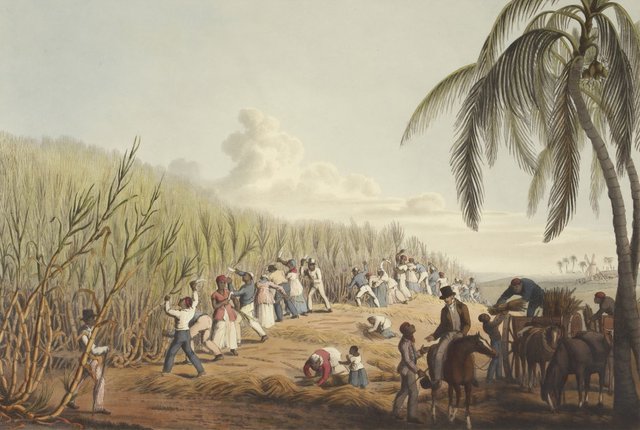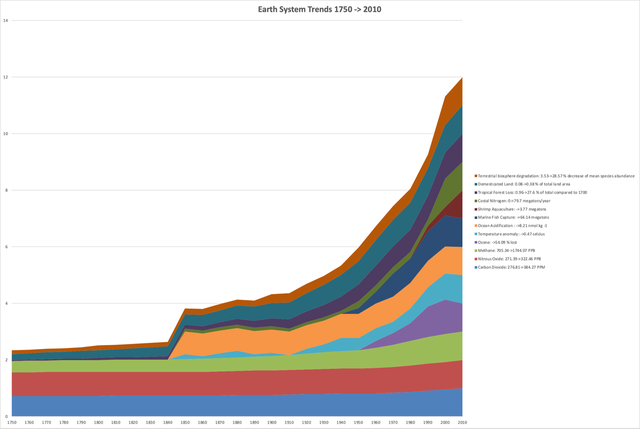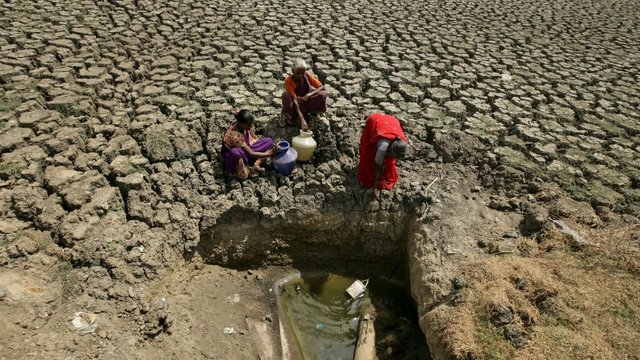Climate change and colonialism: a perfect match.


We have to go all the way back
The entanglement between the two is on three levels. The first link between climate and colonialism is historical. Anthropogenic (man-made) climate change is often linked to the industrial revolution. The use of coal, as a consequence, skyrocketed. Where the local impact on the environment and health became apparent almost immediately, it later led to the discovery of the greenhouse effect on a planetary scale.
Others bring it back to the "Great Acceleration" in the 1950s: the start of an increase in the growth rate of human activities and corresponding degradation of ecosystems.
The Great Acceleration refers to the dramatic continual and roughly simultaneous surge in growth rate across a large range of measures of human activity, first recorded in mid-20th century and continuing to this day.[1][2] Within the concept of the proposed epoch of anthropocene, these measures are those specifically of humanity's impact upon the Earth's geology and its ecosystems. – Wikipedia
In the early 1990s - when capitalism was exported across almost the entire globe - the acceleration accelerated. Today, that exponential curve is still rising. Both the industrial revolution and the "Great Acceleration" are seen as the cradle of a new geological era, the Anthropocene:
The Anthropocene has emerged as a popular scientific term used by scientists, the scientifically engaged public and the media to designate the period of Earth’s history during which humans have a decisive influence on the state, dynamics and future of the Earth System. It is widely agreed that the Earth is currently in such a state. - Working Group on the ‘Anthropocene’

Earth System Trends category of the Great Acceleration of the Anthropocene from 1750 to 2010. The data graphically displayed is scaled for each subcategories' 2010 value. Source data is from the International Geosphere-Biosphere Programme www.igbp.net
Climate change is just one feature of the Anthropocene, alongside pollution, acidification, desertification, and its effects, in particular on health and migration.
Well, geoscientists Lewis and Maslin show in convincing ways that the Anthropocene doesn't start with the Industrial Revolution or the Great Acceleration, but that we have to go back all the way to colonialism. The effect of colonialism on ecology - think of the connection of two continental ecosystems, the genocides that followed this “Columbian Exchange”, or think about large-scale plantations on which people were forced into slave labor - was so great that it left its mark on geological sediments.
Europe's colonization project, according to Lewis and Maslin, marks the beginning of the current, globally interconnected economy and ecology, which has set the earth on a new evolutionary path. Colonialism is the transition to a profit-oriented way of life, and a decisive change in the relationship between the Homo Sapiens and nature, namely one that has to be productive. In a sense, climate change began with colonialism and slavery: it is a story of how people treat the environment and how people treat each other.
The arrival of Europeans, in particular the British and Spanish, had a profound impact on central and southern America,” Maslin told the Observer. “They carried germs for smallpox, measles, flu, typhoid and many other diseases that led to the deaths of more than 50 million Americans – who had no previous exposure to these pathogens – within a few decades. Society in America collapsed and subsistence farming there was wiped out.
Within decades of the discovery of America, Europeans were eating its potatoes and tomatoes, while China and India were consuming its peppers. These imports also had a profound impact. In China, for example, the arrival of maize allowed drier lands to be farmed, driving new waves of deforestation and a large population increase.
The colonising of America resulted in a trade triangle: manufactured goods from Europe were sold to Africa for slaves, who were transported to the Americas to grow cotton and tobacco for Europe. For the first time, the world was bound into a single global economic system. Globalisation had begun and its impact on the planet has since been vast. One result has been the homogenisation of life on Earth. Rats and other pests carried on ships have overrun the habitats of isolated species, while more and more land has been turned over to agriculture.

Europeans such as the Spanish explorers shown here brought germs, as well as slavery, to the Americas. Source: The Guardian. Photograph: Rex

Two sides of the same coin
The causes of climate change are not only linked to the history of colonialism, but also to its logic of exploitation and the idea that nature is freely available to us. [Alexander von Humboldt]( (1769-1859) already made the connection between colonialism and the destruction of the natural environment and saw colonialism and slavery as two sides of the same coin: the exploitation of nature and man as a means, not an end in itself, and denying the laws of ecology that everything is connected to everything.
The colonization of nature required theories that normalized the constant depletion of nature as property, similar to racial theories that justified human colonization. – Naomi Klein in "On fire. The burning Case for a Green New Deal."
Climate Apartheid
The third link between climate change and colonialism, in addition to the historical and the substantive, is symptomatic in nature. After all, the consequences of climate change are undergone by those who are least responsible for it. In fact, the political unwillingness in the global north to do something about it prevails because the effects are still largely felt by the "others" in the global south.
While climate ambitions may meet Western concerns, they are far from sufficient to prevent humanitarian disasters in the South. This reveals a geographical bias. UN human rights expert Philip Alston speaks of "environmental racism". Climate refugees are essentially political refugees because the choice of whether or not to do something about the causes of fleeing is political. This has far-reaching implications.

Source: CNN. 'Climate apartheid' to push 120 million into poverty by 2030.
Climate change threatens to undo the last 50 years of progress in development, global health, and poverty reduction. Developing countries will bear an estimated 75% of the costs of the climate crisis, the report said, despite the poorest half of the world’s population causing just 10% of carbon dioxide emissions.
Yet democracy and the rule of law, as well as a wide range of civil and political rights are every bit at risk. The risk of community discontent, of growing inequality, and of even greater levels of deprivation among some groups, will likely stimulate nationalist, xenophobic, racist and other responses. Maintaining a balanced approach to civil and political rights will be extremely complex.

References:
- Anthropocene now: influential panel votes to recognize Earth’s new epoch
- Working Group on the ‘Anthropocene’. Released 21st May 2019.
- book: The Human Planet: How We Created the Anthropocene by Simon L. Lewis, Mark Maslin.
- How our colonial past altered the ecobalance of an entire planet
- interview: Naomi Klein Knows a Green New Deal Is Our Only Hope Against Climate Catastrophe
- ‘Climate apartheid’: UN expert says human rights may not survive